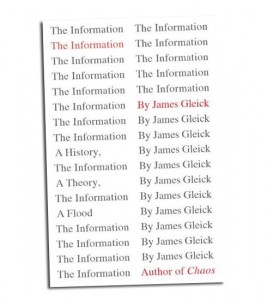“The Information: A Theory, A History, A Flood” by James Gleick
May 15, 2011
 The Information: A Theory, A History, A Flood the new book by James Gleick, author of Chaos, Genius and Isaac Newton is 2/3 of an amazing work. The theory and the history are there in great and compelling detail but the flood? A mere 26 pages at the end of this 426 page book.
The Information: A Theory, A History, A Flood the new book by James Gleick, author of Chaos, Genius and Isaac Newton is 2/3 of an amazing work. The theory and the history are there in great and compelling detail but the flood? A mere 26 pages at the end of this 426 page book.
From African talking drums and the need for redundancy in their messages to Charles Babbage (the Difference Engine), Ada Byron (the world’s first programmer?) and Claude Shannon (who created the field of information theory with his 1948 article A Mathematical Theory of Communication) Gleick covers this territory thoroughly and, as is his particular gift, makes engineering, hard science and intellectual striving as clear and exciting as Spielberg does an Indiana Jones action sequence. But all of this is the background to today’s networked world of instant communication (if not always information).
I closed the book wishing for more. I’d like Gleick to guide me through the current flood, analyzing it and pointing the way, perhaps, to future trends and coping strategies. Despite this, I’d highly recommend this book to anyone with even a passing interest in learning how we got to where we are today, clicking and tapping and swiping our lives away staying current and connected. Gleick gains bonus points from me personally for name-checking one of my heroes, Richard Dawkins and offering a solid explanation of a meme.
However, I’m pleased that even someone so knowledgeable as Gleick shows his own limits. On page 230 he refers to Pickup on Noon Street as a Raymond Chandler novel. Of course, we Chandlerites know this is a mistake, there is no novel in the canon by that name. It’s a short story.
There’s a collection of 4 stories published under that title, but that packaging does not make a new Chandler novel, as fervently as we might wish it. Shocking that a major book published by Random House would allow this small mistake to pass through the editing process. It seems to be true then, that no one “reads” anymore, not even copy editors at the world’s largest English language trade publisher.
Comments
Got something to say?
You must be logged in to post a comment.
